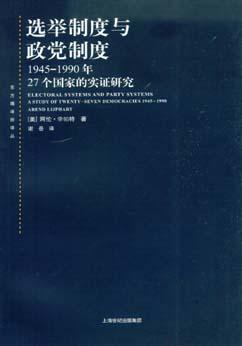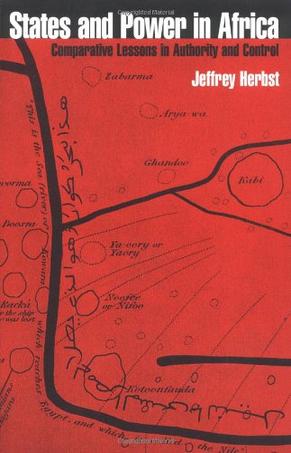-

The Logic of Violence in Civil War
By analytically decoupling war and violence, this book explores the causes and dynamics of violence in civil war. Against the prevailing view that such violence is an instance of impenetrable madness, the book demonstrates that there is logic to it and that it has much less to do with collective emotions, ideologies, and cultures than currently believed. Kalyvas specifies a novel theory of selective violence: it is jointly produced by political actors seeking information and individual civilians trying to avoid the worst but also grabbing what opportunities their predicament affords them. Violence, he finds, is never a simple reflection of the optimal strategy of its users; its profoundly interactive character defeats simple maximization logics while producing surprising outcomes, such as relative nonviolence in the 'frontlines' of civil war. -

选举制度与政党制度
《选举制度与政党制度:1945-1990年27个国家的实证研究》作者阿伦·李帕特,摆在我们面前的是新制度主义政治学大师的又一部力作,它完成于20世纪90年代,虽然研究方法带有浓厚的美国色彩和比较政治学的痕迹,但是这恰恰构成了其学术价值的重要组成部分,特别对中国政治学界来说,如何将政党和选举研究赋予更加科学和国际化的意义,比较研究方法显然是一种有效的工具。 -

Understanding Ethnic Violence
This 2002 book seeks to identify the motivations of individual perpetrators of ethnic violence. The work develops four models, labeled Fear, Hatred, Resentment, and Rage, gleaned from existing social science literatures. The empirical chapters apply these four models to important events of ethnic conflict in Eastern Europe, from the 1905 Russian Revolution to the collapse of Yugoslavia in the 1990s. Each historical chapter generates questions about the timing and target of ethnic violence. The four models are then applied to the case, to learn which does the best job in explaining the observed patterns of ethnic conflict. The findings challenge conventional wisdom, in that the Resentment narrative, centered on a sense of unjust group status, provides the best fit for a variety of cases. While Fear, Hatred, and Rage do motivate hostile actions, Resentment pervasively appears to inflame ethnic animosity and drive outcomes in the timing and pattern of action. -

State Formation, Nation Building and Mass Politics in Europe
Stein Rokkan was one of the leading social scientists of the post-war world. He was a prolific writer, yet nowhere is his contribution to social science - the conceptual and developmental map of Europe - presented in an integrated and systematic way. Stein Rokkan had plans to do this but died before the work could be started. Drawing on Rokkan's published, unpublished, and translated writings, this book systematizes and integrates Rokkan's numerous writings in the way he wanted to do himself. -

States and Power in Africa
Theories of international relations, assumed to be universally applicable, have failed to explain the creation of states in Africa. There, the interaction of power and space is dramatically different from what occurred in Europe. In his ground-breaking book, Jeffrey Herbst places the African state-building process in a truly comparative perspective, examining the problem of state consolidation from the precolonial period, through the short but intense interlude of European colonialism, to the modern era of independent states. Herbst's bold contention - that the conditions now facing African state-builders existed long before European penetration of the continent - is sure to provoke controversy, for it runs counter to the prevailing assumption that colonialism changed everything. In identifying how the African state-building process differs from the European experience, Herbst addresses the fundamental problem confronting African leaders: how to extend authority over sparsely settled lands. Indeed, efforts to exert control over vast, inhospitable territories of low population density and varied environmental and geographical zones have resulted in devastating wars, millions of refugees, and dysfunctional governments perpetrating destructive policies. Detailing the precise political calculations of distinct African leaders, Herbst isolates the basic dynamics of African state development. In analyzing how these leaders have attempted to consolidate power, he is able to evaluate a variety of policy alternatives for dealing with the fundamental political challenges facing African states today. -

中国共产党转型与中国的变迁
本书在国内首次对海外学者关于中国共产党的研究成果进行了系统的梳理,划分了其主要发展阶段,提出了一个以“控制—制衡”为核心的分析框架,并从党与市场、党与国家、党与社会三个维度对其研究内容进行了阐述,得出如下启示:在从革命党向执政党的历史转型中,中国共产党同时面临着两大根本任务:一是适应改革开放之后中国社会经济环境的变化,承担中国国家建设的历史重任;二是维持自身的组织存在与政治认同。这两大根本任务之间存在一种辩证关系,同时,与改革开放后中国的政治变迁息息相关。